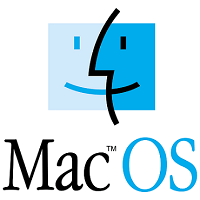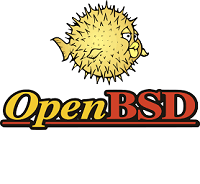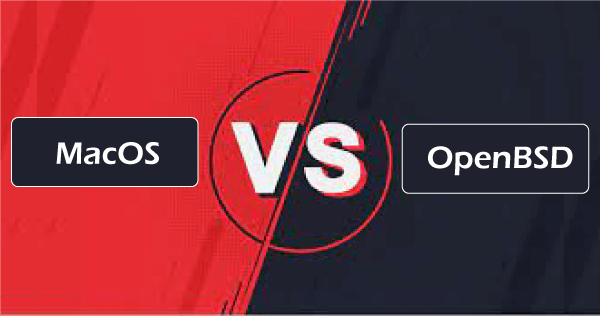Difference between MacOS and OpenBSD
In this article, you will learn the difference between MacOS and OpenBSD. But before discussing the differences, you must know about MacOS and OpenBSD.
What is MacOS?

MacOS is a collection of proprietary graphical OSs which Apple Incorporation develops. It was earlier known as Mac OS X and then OS X. It is mainly developed for the Apple Mac systems. It was developed using C, Objective-C, C++, Swift, and assembly language. After Windows, it is the second most popular operating system for PCs. Apple released the initial version of macOS in 2001.
Advantages and disadvantages of MacOS
There are various advantages and disadvantages of the MacOS. Some advantages and disadvantages of the MacOS are as follows:
Advantages
There are various advantages of the MacOS. Some advantages of the MacOS are as follows:
- The MacOS uses the same GUI as other Apple products like the iPhone and tablets.
- It is the second most used OS and has fewer active users, so there are fewer chances of virus attacks. Another reason for its virus resistance is its UNIX relationship that is more secure than the Windows OS.
- As Apple makes hardware and software, its hardware communication is very efficient and improves performance.
- Because Apple creates both hardware and software, its hardware communication is highly efficient and enhances performance. The OS and hardware are both work excellent. Apple computers have a longer lifespan than other types of computers. Mac laptop batteries last longer as well.
- Compared to other operating systems, Mac users get a better response from the company’s support team. Apple uses highly experienced engineers that assist users in resolving difficulties with their hardware and software.
- It supports window file system formats like NTFS and FAT.
- You may run the Windows OS if you have installed MacOS by using Bootcamp and parallel software.
Disadvantages
There are various disadvantages of the MacOS. Some disadvantages of the MacOS are as follows:
- It is a very expensive system. You may get a good windows pc with more hardware specifications at this cost.
- The latest version of the macOS system supports fewer USB ports and doesn’t include a CD/DVD writer.
- Most game developers wish to build games on the Windows operating system since it has more users. There are fewer games accessible for Mac users. Furthermore, mac systems have low graphics capability to run high-resolution games. Some software is only available for Windows users and is not available for Mac users, such as Adobe Premiere Pro, etc.
- It may read the NTFS and FAT windows format, but the Windows OS may not read the MacOS file system. If you want to read the macOS file system by windows OS, you have to install the third-party software in Windows OS.
What is OpenBSD OS?

It is a free and open-source OS that is provided by the OpenBSD project. The main focus of this OS is security. It uses the Berkeley Software Distribution as a foundation. It is similar to UNIX operating system. It is available for various platforms, including workstations, NAS, servers, and embedded systems. It’s basically written in C, assembly, Perl, and the UNIX shell. In 1995, the first version of OpenBSD was released. It uses a monolithic kernel.
Features of OpenBSD OS
There are various features of the OpenBSD OS. Some features of the OpenBSD OS are as follows:
- OpenBSD OS is a free and open-source OS.
- It provides support for many hardware platforms.
- It is designed to minimize the requirement for customization.
- It is similar to the UNIX operating system available in source and binary forms.
- It is often considered to have the best documentation of any OS. Documentation errors are classified as major bugs.
- It runs on the multi-platform 4BSD operating system, which is a Unix-based platform with strong security features.
- OpenBSD OS includes OpenSSH, which is cryptographic software for encrypting user data.
Main differences between the MacOS and OpenBSD OS

Here, you will learn the main differences between the MacOS and OpenBSD OS. There are various differences between the MacOS and OpenBSD OS. Some of the differences are as follows:
- MacOS was developed by Apple Incorporation and was firstly launched in 2001. On the other hand, OpenBSD was developed by the OpenBSD project and was firstly launched in 1995.
- MacOS have various native APIs, including Java, Carbon, BSD-POSIX, and Cocoa. On the other hand, OpenBSD also has some native APIs, including BSD-POSIX.
- MacOS kernel type is Hybrid with the modules. On the other hand, the OpenBSD kernel type is monolithic with the modules.
- MacOS is designed for workstations, PCs, and embedded platforms. On the other hand, the OpenBSD is designed for servers, NAS, workstations, and embedded systems.
- MacOS update management is Software Update. On the other hand, the OpenBSD OS update management is by binary or by source.
- MacOS subsystems enable non-native APIs like Toolbox, Win16, and Win32. On the other hand, the OpenBSD subsystem doesn’t support non-native APIs.
- MacOS has the preferred license of GNU GPL, APSL, and Proprietary. In contrast, OpenBSD has the preferred license of ISC.
- MacOS provides package management via the MacOS installer. On the other hand, OpenBSD provides package management via the Ports collection and packages.
- MacOS supports the following computer architectures: x86-64, IA-32, and PowerPC. On the other hand, OpenBSD supports the following computer architectures: IA-32, Alpha, x86-64, SPARC, 68k, and VAX.
Head-to-head comparison between the MacOS and OpenBSD OS
Here, you will learn the head-to-head comparison between the MacOS and OpenBSD OS. There are various differences between the MacOS and OpenBSD OS. Some of the differences are as follows:
| MacOS | OpenBSD OS |
|---|---|
| Apple Incorporation developed it and firstly launched it in 2001. | The OpenBSD project was developed and firstly launched in 1995. |
| It has the preferred license of GNU GPL, APSL, and Proprietary. | It has the preferred license of ISC. |
| It provides package management via the MacOS installer. | It provides package management via the Ports collection and packages. |
| Its subsystem enables non-native APIs like Toolbox, Win16, and Win32. | Its subsystem doesn’t support the non-native APIs. |
| It has various native APIs, including Java, Carbon, BSD-POSIX, and Cocoa. | It also has some native APIs, including BSD-POSIX, etc. |
| It is designed for workstations, PCs, and embedded platforms. | It is designed for workstations, NAS, servers, and embedded systems. |
| MacOS kernel type is Hybrid with the modules. | OpenBSD OS kernel type is monolithic with the modules. |
| It supports the following computer architectures: x86-64, IA-32, and PowerPC. | Its supports the following computer architectures: IA-32, Alpha, x86-64, SPARC, 68k, and VAX. |
| MacOS update management is Software Update. | OpenBSD OS update management is by binary or by source. |
| It supports the file system like HFS+, UFS, AFP, FAT, SMBFS, APFS, HFS, NTFS, FTP, ISO 9660, WebDAV, and ZFS. | It supports the file systems like FFS, ISO 9660, FAT, ext2, and NFS. |
